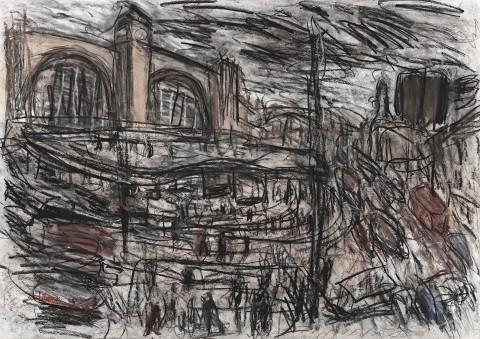VIEW OF KING’S CROSS AND PENTONVILLE ROAD I, 1997
LEON KOSSOFF
pastel and charcoal on paper
59.5 x 84.0 cm
inscribed with initials verso: LK0052
bears inscription on backing verso: 52
Annandale Galleries, Sydney (label attached verso)
Private collection, Sydney, acquired from the above in 2001
Leon Kossoff, Recent Paintings and Drawings, Mitchell-Innes & Nash, New York, 13 April – 20 May 2000; Annely Juda Fine Art, London, 1 June – 22 July 2000, cat. 52 (label attached verso)
LEON KOSSOFF, Annandale Galleries, Sydney, 21 March – 12 May 2001, cat. 29 (illus. in exhibition catalogue, p. 34)
Heathcote, C., ‘Leon Kossoff Bliss in the Here and Now’, Art and Australia, Fine Arts Press, Sydney, vol. 38, no. 4, Winter 2001, pp. 534 – 535 (illus.)
King's Cross, March Afternoon, 1998, oil on panel, 147.0 x 198.0 cm, Private collection, illus. in Leon Kossoff Recent Paintings and Drawings, Mitchell-Innes & Nash, New York; Annely Juda Fine Art, London, 2000, p. 93
Executed with undeniable vigour, Leon Kossoff’s charcoal and pastel drawing of the forecourt of King’s Cross station and junction of Pentonville Road in the London borough of Camden bristles with energy, both human and atmospheric. The figures spilling from the mouths of the station and the crowd surging in tides against the grand façade of its edifice are evanescent, only intermittently legible amongst his demiurgic tangle of charcoal lines. The high vantage point from which Kossoff observed this scene imposes an impersonal distance between the viewer and the activity below, while brooding and ominous skies lend a theatricality to the image to counterbalance the dynamic spiral composition drawing the viewer’s eye in opposing directions.
With feverish and unbridled gesture, Kossoff fixes his momentary subjective experience of a world in constant mutation. Echoing the practices of his fellow School of London peers, a translation of the physical and visual sensation of the scene is of greater importance to Kossoff than an academic representational accuracy. The dense strokes and sweeping gestures coalesce into vignettes that Kossoff then uses to inform large oil paintings, often working on multiple drawings of the same subject in tandem, all pinned to the studio wall.
A painter of London, Kossoff has observed over thirty years of sustained artistic practice the accelerated transformation of the city from the ruins of the Blitz through to today’s sleek urban metropolis. He has painted, in his characteristic muddy impasto, many views of the city, particularly ones that encapsulate its business, its beating heart of human activity. In conversation in 1996, the artist explained that ‘London, like the paint I use, seems to be in my bloodstream, it’s always moving – the skies, the streets, the buildings’.1 Anchored in rigorous practice of immediate plein air observation and an intimate and personal interaction with the city, Kossoff’s cityscapes in paint and pastel are in fact composite images of many different superimposed observations, combined to discover the underlying essence of each place, the fundamental interaction between space, light and the people who inhabit it. This is the glorious celebration of life, in all its relentless and grimy glory, that Kossoff presents simply and humbly in each of his compositions. Surpassing the accessible appeal of illustration, Kossoff’s drawing absorbs and harnesses the viewers’ attention, endowing the otherwise modest genre of landscape painting with emphatic expression.
Kossoff is one of the most influential figurative painters in Britain, amongst the last remaining members of a group of artists operating in London immediately after World War Two, including Lucian Freud, Frank Auerbach and Francis Bacon. Loosely grouped together under the ‘School of London’ umbrella, many of these artists studied under David Bomberg and consequently adopted a similar spontaneous and haptic style of painting. In 1995, Kossoff was included in a group exhibition held in the British Pavilion at the Venice Biennale. A year later, a retrospective exhibition celebrating Kossoff’s career was held at the Tate. Today, the artist’s works are held in major museum collections around the world, such as the Museum of Modern Art, New York and the Tate Gallery in London.
1. Moorehouse, P., Leon Kossoff, Tate Gallery, London, 1996, p. 36
LUCIE REEVES-SMITH
